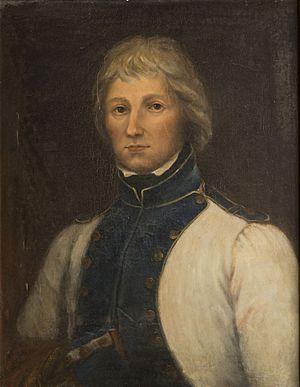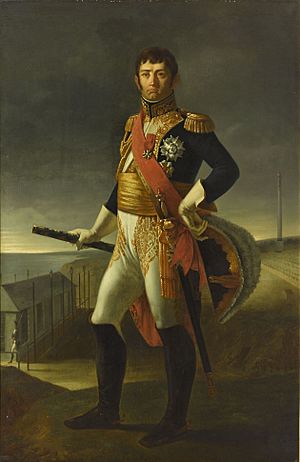Jean-de-Dieu Soult facts for kids
Quick facts for kids
Marshal General
Jean-de-Dieu Soult
Duke and Peer, GOLH, KOHS, COSL
|
|
|---|---|
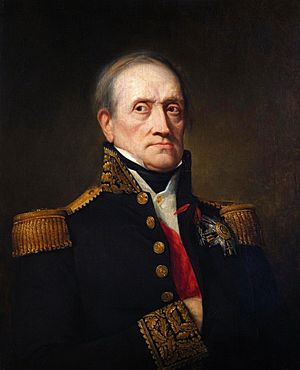
Portrait by George Healy, 1840
|
|
| Prime Minister of France | |
| In office 29 October 1840 – 18 September 1847 |
|
| Monarch | Louis Philippe I |
| Preceded by | Adolphe Thiers |
| Succeeded by | François Guizot |
| In office 12 May 1839 – 1 March 1840 |
|
| Monarch | Louis Philippe I |
| Preceded by | Louis-Mathieu Molé |
| Succeeded by | Adolphe Thiers |
| In office 11 October 1832 – 18 July 1834 |
|
| Monarch | Louis Philippe I |
| Preceded by | Casimir Perier |
| Succeeded by | Étienne Maurice Gérard |
| Minister of War | |
| In office 29 October 1840 – 10 November 1845 |
|
| Prime Minister | Himself |
| Preceded by | Amédée Despans-Cubières |
| Succeeded by | Alexandre Moline de Saint-Yon |
| In office 17 November 1830 – 18 July 1834 |
|
| Prime Minister | Jacques Laffitte Casimir Perier |
| Preceded by | Étienne Maurice Gérard |
| Succeeded by | Étienne Maurice Gérard |
| In office 26 November 1814 – 11 March 1815 |
|
| Prime Minister | Pierre Louis Jean Casimir de Blacas |
| Preceded by | Pierre Dupont de l'Étang |
| Succeeded by | Henri Clarke |
| Personal details | |
| Born | 29 March 1769 Saint-Amans-la-Bastide, France |
| Died | 26 November 1851 (aged 82) Saint-Amans-la-Bastide, Tarn, France |
| Political party | Resistance Party |
| Spouse |
Jeanne-Louise-Elisabeth Berg
(m. 1796; died 1851) |
| Children | 3 |
| Profession | Military officer |
| Signature | |
| Military service | |
| Allegiance |
|
| Branch/service | Army |
| Years of service | 1785–1815 |
| Rank | Marshal of the Empire |
| Unit |
|
| Battles/wars | |
Marshal General Jean-de-Dieu Soult (born March 29, 1769 – died November 26, 1851) was a famous French general and politician. He was known as Marshal Soult. In 1804, he became a Marshal of the Empire. He was one of only six people in French history to receive the special title of Marshal General of France.
Soult was also the Prime Minister of France three times. He played a big part in many of Napoleon's military campaigns. A key moment was at the Battle of Austerlitz, where his troops made the winning attack. Later, during the Peninsular War in Portugal, he was nicknamed "King Nicolas." He also helped create the French Foreign Legion in 1831.
Contents
Early Life and Military Start
Soult was born in Saint-Amans-la-Bastide, a town now named Saint-Amans-Soult in his honor. His father was a notary, which is like a lawyer. Jean-de-Dieu was expected to become a lawyer too.
But in 1785, when he was 16, he joined the Royal-Infanterie regiment. He did this to help his mother financially after his father passed away. His younger brother, Pierre-Benoît Soult, also became a general later on.
Fighting in the Revolutionary Wars
Jean Soult fought in the wars of Revolutionary France. Because he had a good education, he quickly became a sergeant. In 1791, he became an instructor for a group of volunteers. By 1792, he was a second lieutenant.
The war began in April 1792, and Soult quickly moved up the ranks. He became a captain in 1793. He fought in battles like Battle of Kaiserslautern and Second Battle of Wissembourg. He was known for being calm and brave.
In 1794, he joined the Army of Sambre and Meuse. He was promoted to brigadier general. For the next five years, Soult served in Germany. He fought under famous generals like Jean-Baptiste Jourdan and Jean Victor Marie Moreau. He became a division general in 1799.
Soult then joined the Army of Helvetia under General André Masséna. He became very famous for his military skills during this time. He fought in the First Battle of Zurich in 1799. He also led his troops across the Linth River, defeating enemy forces.
Serving the Consul Napoleon
In 1800, Napoleon Bonaparte was the First Consul of France. He asked Masséna to reorganize the Army of Italy. Masséna insisted that Soult be his second-in-command. Soult was given charge of the right side of the army.
Soult showed great bravery defending the city of Genoa. He led attacks against the Austrian army. In one battle in April 1800, he was shot in the leg and captured. He spent days in a terrible hospital. This experience made him more careful in future battles.
He was freed after Napoleon's victory at the Battle of Marengo in June 1800. Soult then became the military commander of Piedmont. He successfully stopped a rebellion there.
After returning to Paris, Napoleon welcomed him warmly. In 1802, Soult became one of the four generals to lead the Consular Guard. In 1803, he took command of the Camp of Boulogne. He was a strict leader, which made the French troops very effective. This earned him the nickname "Bras de Fer" ("Iron Arm").
Napoleonic Wars
Becoming a Marshal
In May 1804, Soult was one of the first 18 generals to be named a Marshal of the Empire. He led a corps (a large military unit) in the march towards Ulm. At the Battle of Austerlitz, he led the main attack that won the battle.
Soult fought in many important battles of Napoleon's Grande Armée. These included Austerlitz in 1805 and the Battle of Jena in 1806. In 1808, Napoleon made him the 1st Duke of Dalmatia. Soult was not happy with this title. He felt he should have been the Duke of Austerlitz, but Napoleon kept that title for himself.
Fighting in Spain
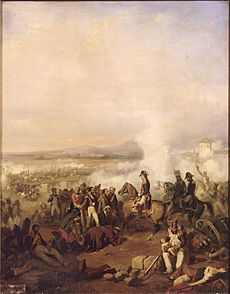
In 1808, Soult was sent to Spain to conquer it. He won the Battle of Gamonal. Napoleon then ordered him to chase the British army led by Sir John Moore. At the Battle of Coruña, Moore was killed. However, Soult could not stop the British from escaping by sea.
For the next four years, Soult stayed in Spain during the Peninsular War. In 1809, he invaded Portugal and captured Porto. But he was cut off by Portuguese forces. He tried to set up a new government in Portugal, hoping to become king there. This made some of his own officers dislike him.
He was eventually forced out of Portugal by Sir Arthur Wellesley (who later became the Duke of Wellington). Soult had a very difficult retreat through the mountains. After the Battle of Talavera, Soult became the chief of staff for French forces in Spain. He won a big victory at the Battle of Ocana in November 1809.
In 1810, he invaded Andalusia and quickly took control. But he focused on capturing Seville, which meant he missed the chance to capture Cádiz. This led to a long and unsuccessful Siege of Cadiz for the French. In 1811, Soult marched north and took Badajoz. When the British and Portuguese armies besieged Badajoz, he marched to help. He fought in the very bloody Battle of Albuera in May.
In 1812, after Wellington's victory at Salamanca, Soult had to leave Andalusia. He then managed to push Wellington's army back to the Portuguese border. Soon after, he was called back from Spain. He often disagreed with Joseph Bonaparte, who was Napoleon's brother and the King of Spain.
Defending France
In 1813, Soult took command of a corps in Napoleon's main army. He fought at Lützen and Bautzen. But he was soon sent to southern France with full power. His job was to fix the problems caused by the French defeat at Vitoria. Soult did a great job reorganizing the French army, which was very low on morale.
His last attacks into Spain were stopped by Wellington at the Battle of the Pyrenees. He was also defeated by Spanish forces at Battle of San Marcial. Wellington then chased Soult into France. Soult was forced out of several positions at Nivelle, Nive, and Battle of Orthez. He then faced Wellington at the Battle of Toulouse. Even though it was a defeat, Soult caused heavy losses to Wellington's army.
Waterloo Campaign
After Napoleon gave up power in 1814, Soult said he supported the king. He became Minister of War. But when Napoleon returned from Elba in 1815, Soult quickly supported him again. He became a peer of France. He served as Napoleon's chief of staff during the Waterloo campaign. However, he did not perform as well in this role as he had as a commander.
Some historians believe Soult's presence at Waterloo was a reason for Napoleon's defeat. There was bad feeling between Soult and another senior commander, Marshal Michel Ney. Also, Soult was not as good at planning and administration as Napoleon's previous chief of staff. For example, an order Soult wrote to Marshal Emmanuel de Grouchy was very confusing. Grouchy misunderstood it, which led to problems for Napoleon's army.
Political Career
After Napoleon's final defeat in 1815, Soult went to live in Germany. But in 1819, he was called back to France. In 1820, he was again made a Marshal of France. He tried to show he was a strong supporter of the king. In 1827, he became a peer.
After the revolution of 1830, Soult supported Louis Philippe. Louis Philippe welcomed his support. He gave Soult the special title of Marshal General of France again. Only a few other people in history had held this title.
Creating the French Foreign Legion
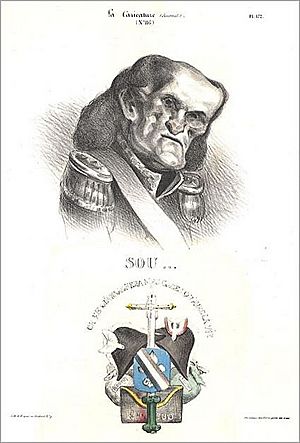
As Minister of War from 1830 to 1834, Soult worked to rebuild the French military. The army was small, and Soult wanted to double its size. He made important changes from 1831 to 1832.
The first big change was creating the French Foreign Legion on March 9, 1831. This was a group of foreign volunteers. They could only be used outside of France. Their main job was to guard Algiers, which France had recently conquered. At first, the army did not like the Legion. They even called it the "Bastard of Soult."
Military Improvements
Louis-Philippe wanted to make the army stronger to keep public order. Marshal Soult wrote a report to the king in 1831. He suggested ways to increase the army's size. He also wanted to improve how soldiers were promoted and make sure there were enough weapons.
After creating the Legion, Soult passed laws about military pensions. He also made new rules for army recruitment and promotions. He oversaw the building of defenses around Paris. In 1831, he was sent to Lyon with 20,000 men. His job was to stop a revolt by silk workers. He succeeded, but he became very unpopular with people who supported a republic.
Serving as Prime Minister
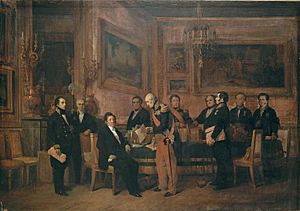
Soult was the President of the Council of Ministers (Prime Minister) for the first time from 1832 to 1834. France had promised to protect the Treaty of the XXIV articles. So, Soult ordered Marshal Étienne Maurice Gérard to capture the city of Antwerp. After strong resistance from the Dutch, Antwerp was taken in December 1832 and given to Belgium.
In 1838, Louis-Philippe chose Soult to represent France at the coronation of Queen Victoria in London. Soult received a great welcome there. His old enemy, the Duke of Wellington, reportedly greeted him by saying, "I have you at last!"
Soult became Prime Minister again from 1839 to 1840. He also handled foreign affairs. He took part in the ceremonies when Napoleon's ashes were brought back to France in December 1840.
He was Prime Minister for almost seven years, from 1840 to 1847. During this time, he let his Minister of Foreign Affairs, François Guizot, manage most of the government. When Soult left the government due to health reasons, Guizot took over as Prime Minister. In 1847, Louis-Philippe gave Soult the special title of Marshal General of France once more.
In 1848, Soult said he supported the idea of a republic. He passed away three years later in his castle near Saint-Amans-la-Bastide, where he was born. The town was renamed Saint-Amans-Soult in his honor in December 1851.
Military Skills
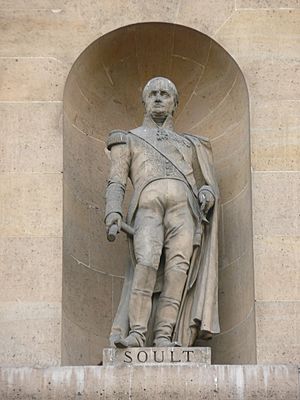
Soult was a very skilled military planner. For example, after the Battle of Vitoria, he quickly reorganized the French army. This army had lost its morale, but Soult made it strong again in a short time. His armies were usually well-prepared before battles.
However, Soult sometimes struggled with tactics during a battle. Wellington once said that Soult "never seemed to know how to handle troops after a battle had begun." This means he was better at planning before the fight than reacting during it. For example, at the Battle of Albuera, he started brilliantly but then allowed his generals to make mistakes.
Despite some tactical weaknesses, Soult's overall performance, especially in the later parts of the Peninsular War, showed his great talent as a general. Even though he was often defeated by Wellington, he led a clever defense.
Family Life
On April 26, 1796, Soult married Johanna Louise Elisabeth Berg. They had three children together:
- Napoléon (1802–1857), who became the 2nd Duke of Dalmatia. He had no sons, so the title ended after him.
- Hortense (1804–1862)
- Caroline (1817–1817)
Images for kids
See also
 In Spanish: Jean-de-Dieu Soult para niños
In Spanish: Jean-de-Dieu Soult para niños
 | Victor J. Glover |
 | Yvonne Cagle |
 | Jeanette Epps |
 | Bernard A. Harris Jr. |


